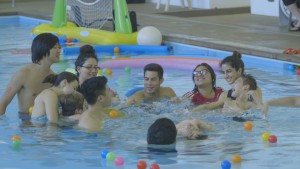CSUN Center Opens Up the World of Possibilities for Children with Disabilities
Marina Forain admits she can get emotional when she thinks about the progress her 6-year-old daughter Isabella has made in the two years she has taken part in the children’s programs at California State University, Northridge’s Center of Achievement Through Adapted Physical Activity.
Isabella, who has a rare genetic disorder that leaves her nonambulatory, has learned to float in the center’s pool, and the center’s land-based program has helped her motor development to the point where she can move more and more on her own.
“I am so grateful for the program,” Forain said. “To see her progress is just amazing. She loves to be here. She loves to be around other kids. It’s like physical therapy for her, but having fun.”
When CSUN’s Center of Achievement Through Adapted Physical Activity opened more than 40 years ago, it was a land-based program and most of its clients were adults. The center expanded in 2003 to include a water-based program with the opening of the Abbott and Linda Brown Western Center for Adaptive Aquatic Therapy.

Over the past few years, CSUN’s Center of Achievement Through Adapted Physical Activity has expanded its offerings with programs — land-based and aquatic — designed specifically to meet the needs of children. Photo by Richard Chambers.
Over the past few years, the center has expanded its offerings with programs — land-based and aquatic — designed specifically to meet the needs of children.
“The center was primarily designed for adults, and we are now growing the children’s programs,” said Teri Todd, an associate professor of kinesiology and director of children’s services in the Center of Achievement.
The Adapted Aquatics for Children program is geared toward children with special needs. Each child is paired with a CSUN undergraduate kinesiology student. The CSUN students work with the children on basic swimming skills, as well as gait and balance. The water’s buoyancy provides the children with an ability to in ways they aren’t able to outside of the pool, Todd said.
The land-based Sensory Motor Program is an inclusive program for children with and without disabilities. That program focuses on fundamental motor skills. Undergraduate kinesiology students develop games and other play scenarios to encourage the development of motor skills in the children they work with. Todd noted that for many of the children with disabilities in the land-based program, the class may be first time they have played with typical developing children outside of their families.
Todd works with the CSUN students in both programs to develop the goals they want to achieve with their young clients.
“This is a natural progression of taking what they are learning in the classroom and putting it into practical application,” she said. “We have about two weeks to prepare for the children, and that first week of the program every ounce of effort on the [CSUN] students’ part is focused on getting their plans right and making sure no one gets hurt.
“About three weeks out — and those three weeks go by pretty fast — I tell my students to look back to week one, and they all laugh,” Todd said. “They’ve gotten their rhythm and their confidence by the third week, and they know they are making a difference. They’ll tell me that a highlight of their week is to see the smiles from the children they are working with and knowing that the children are happy to see them.”
Sherman Oaks resident Ana Sandler’s 9-year-old daughter, Isabella, takes part in the aquatic program. Sandler called the program the highlight of her daughter’s week.
“Bella has a lot of sensory issues and very limited verbal skills, but she can say ‘I love to swim,’” Sandler said. “We were very lucky to have found this program. I wish I could replicate it all the time. We’ve been in the program for a year, but I still get teary eyed when I think about the progress she has made because of it.”
CSUN kinesiology senior Daniela Ruvalcaba said her time at the Center of Achievement has inspired her to become an occupational therapist specializing in children with disabilities. She works with children in the land-based program, developing games and modifying play activities so that all the children can participate.
“To see the big smiles on their faces, it’s such a great feeling,” she said. “We’re able to teach them different movement patterns, different movement skills. For us [the CSUN students], it’s a very good learning experience because we are able to modify the activities and not limit a child who thinks (he or she) can’t do this because of a disability. We get all the children involved.
“Right now, I am working with child who has a very rare genetic disease,” Ruvalcaba said. “She gets very, very excited when she sees all the kids running around her. To be able to involve her in the activities and to see how happy she is is very fulfilling.
For more information about the programs at CSUN’s Center of Achievement Through Adapted Physical Activity, visit its website at http://www.csun.edu/center-of-achievement. The center is housed in CSUN’s College of Health and Human Development.

 experience
experience